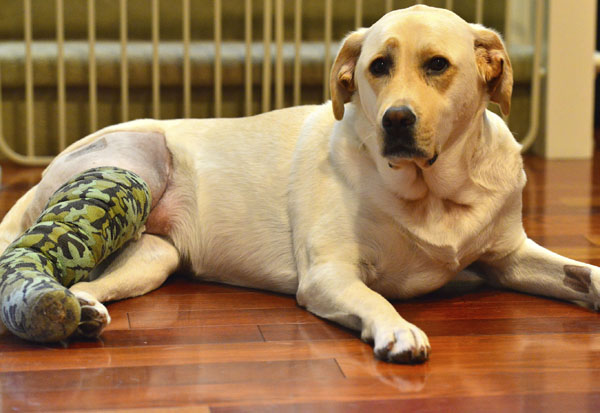
Cruciate repair Pre and Post op Information
Home Rehabilitation Guide
Preparing the House: It is important to have a plan on how and where you are going to restrict or confine your dog during this crucial post-operative period. Quality rest is as important as having a good therapy plan.
Many owners incorporate one of the following:
- Dog crate
- Gated-off area, i.e., kitchen
- Room confinement
No Jumping: It is extremely important not to allow your dog to jump. Overextension of the stifle (knee) could compromise the repair and slow healing time. Remember:
- NO JUMPING on/off bed
- NO JUMPING on/off couch
- NO JUMPING up on you
No Stairs: Stairs, like jumping, will overstress the joint and inhibit repair. In the beginning stages,directly after surgery and until your veterinarian says it is okay, it is imperative that you do what you can to prevent your pet from going up and down stairs. However, if you have no way of avoiding stairs to get your dog into and out of the house, or your dog is too big to carry, you need to take the following precautions:
- Restrict: Make sure to have your leash attached before you open the door.
- Support: Use a towel as belly support or a commercially available harness for belly support.
- Limit: Block off all stairs that your dog could potentially have access to.
No Horsing Around: As much as you would like to play with your dog or have him socialize with other dogs, this is not a good idea until your veterinarian gives you the green light to do so.
Walking Surfaces: Wood floors, tile, linoleum, etc. can all be very slippery to your recovering pet. Consider putting down some throw rugs with rubber backing or yoga mats to make it easier for your dog.
This information is from Page 5 of Home Rehabilitation Guide – TTA Tibial Tuberosity Advancement, Home Therapy Guide for Pet Owners. The entire booklet will be provided on the day of surgery.
Post operative Recovery
You can assist your pets recovery at home by making sure that they’re kept comfortable and warm as it is hard for your pet to maintain their own body temperature after having an anaesthetic.
Feeding after surgery: You can feed their normal diet post surgery but please ensure to feed only a very small meal of about ¼ of what is normally fed as the anaesthetic can cause nausea which can lead to vomiting, so it is best to give a small amount in case this occurs. It is important that they should start eating normally within 24 hours following surgery. Fresh water should be available at all times.
Your pet seems very sleepy, why is that? Your pet has had a general anaesthetic which can take a number of hours to wear off and in some cases cause patients to appear drowsy for a day or so. They may have been placed on a gaseous anaesthetic where a tube is placed in the airway to assist breathing and introduce gas anaesthetic into the airways; this can sometimes irritate the throat for a day or two causing a cough.
Please book an appointment for your pet to have their sutures removed 14 days post op, there will be no charge for the suture removal. Your pet will also need to come back 6-8 weeks post op for repeat radiographs.
Please ensure they are kept clean and dry, NO bathing or swimming during this time. Your pet is NOT allowed to lick, bite or scratch at the stitches. If stitches are removed by your pet they may require another anaesthetic to re-suture (additional charges apply).
If your pet does lick at the stitches we suggest a few options: (Available for purchase in clinic)
– Woundgard Spray (scent/taste deters licking, antiseptic)
– E-Collar/Inflatable Cone (goes around the neck, physically prevents licking/chewing) and must stay on until the stitches are removed, but it can be taken off when your pet is eating.
When should I be concerned?
-
-
-
-
- Lethargy and or vomiting (particularly after 24hrs)
- Excessive redness or irritation around the surgical site
- Swelling or lumpiness around the surgical site
- Bleeding or discharge from the wound
- Unwilling to eat a normal meal 24 hours post surgery
-
-
-
Please call us on 63264900 if you have ANY concerns
